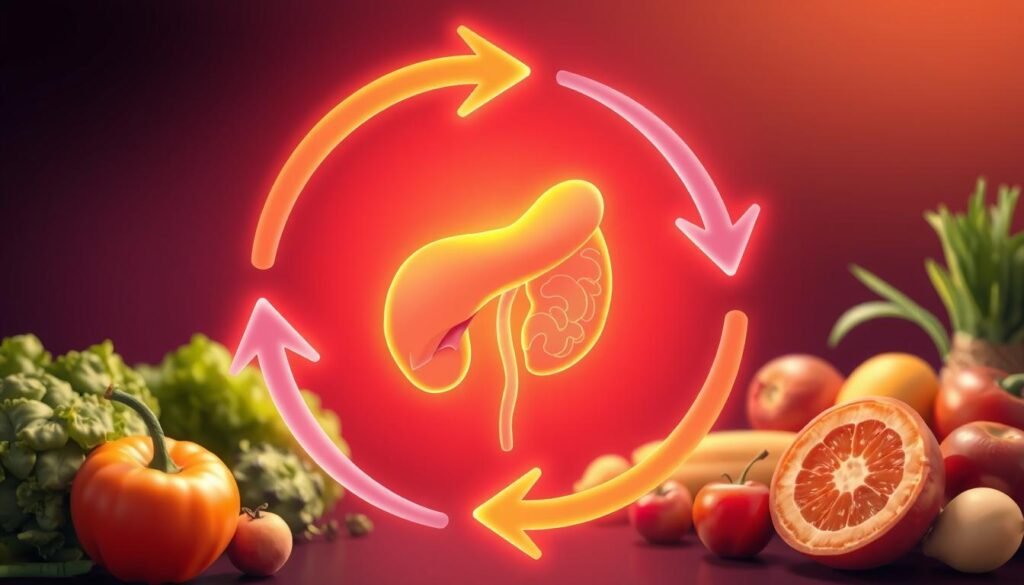Are you looking for a way to boost your health and well-being? Intermittent fasting is a simple yet effective method. It can help you lose weight, improve insulin sensitivity, and even live longer.
Intermittent fasting means switching between fasting and eating. It leads to many health benefits. It can help you lose fat, improve your metabolism, and support healthy aging.
Key Takeaways:
- Intermittent fasting offers a range of health benefits, including weight loss and improved metabolic health
- Fasting periods trigger positive changes in the body, reducing disease risk
- Intermittent fasting can help optimize insulin sensitivity and blood sugar control
- This approach may promote longevity and healthy aging
- Incorporating intermittent fasting into your lifestyle can be a powerful tool for transforming your health
What is Intermittent Fasting?
Intermittent fasting is a popular way to improve health and lose weight. It’s different from just eating less all the time. Instead, it involves periods of eating and fasting.
By fasting, your body gets a break from digesting food. This lets it focus on repairing cells and balancing hormones. This method has many benefits, like better metabolism, more fat burning, and a sharper mind.
Defining Intermittent Fasting
Intermittent fasting means eating in cycles. You fast for certain periods and then eat. The length of these fasts varies by the method you use.
The main goal is to switch your body’s state from fed to fasted. This change can improve your health. When fasting, your body uses fat for energy instead of glucose from food.
Types of Intermittent Fasting Protocols
There are many ways to do intermittent fasting. Here are some common ones:
- 16/8 Method: Fast for 16 hours and eat in an 8-hour window. For example, skip breakfast and eat from 12 pm to 8 pm.
- 5:2 Diet: Eat normally for five days and limit calories to 500-600 on two non-consecutive days.
- Eat-Stop-Eat: Fast for 24 hours once or twice a week, from dinner one day to dinner the next.
- Alternate-Day Fasting: Alternate between fasting days and eating days.
The best of all medicines is resting and fasting. – Benjamin Franklin
Choosing the right fasting schedule is key. Find a method that fits your life and preferences. Listen to your body and adjust as needed for lasting success.
Weight Loss and Fat Burning
Intermittent fasting is great for losing weight and burning fat. It cuts down your calorie intake and changes how your body uses energy. This leads to losing weight and getting leaner.
When you fast, your body starts using fat for energy instead of sugar. This happens because insulin levels go down. So, your body uses stored fat, helping you lose weight and get in shape.
Research shows intermittent fasting is good for losing weight. People have lost a lot of weight, body fat, and even inches around their waist. On average, they lost 3-8% of their body weight in 3-24 weeks.
| Fasting Protocol | Average Weight Loss |
|---|---|
| 16/8 Method | 3-6% |
| 5:2 Diet | 4-8% |
| Alternate-Day Fasting | 3-8% |
Intermittent fasting also helps keep muscle mass while losing weight. This is important for a healthy metabolism and body shape. Fasting boosts growth hormone, which helps keep and build muscle.
Intermittent fasting is a powerful tool for weight loss and fat burning, offering a sustainable and effective approach to improving body composition and overall health.
Adding intermittent fasting to your life can help you reach your weight loss goals. It uses calorie restriction and metabolic changes to improve your health.
Improved Insulin Sensitivity and Metabolic Health
Intermittent fasting greatly improves insulin sensitivity and metabolic health. It allows your body to rest from food for longer periods. This makes your cells better at using insulin, the hormone that controls blood sugar.

During fasting, your body gets better at moving glucose into cells for energy. This boost in insulin sensitivity can stop insulin resistance before it turns into type 2 diabetes.
Lowering the Risk of Type 2 Diabetes
Type 2 diabetes is a condition with high blood sugar and poor insulin function. Intermittent fasting can lower the risk of getting type 2 diabetes by:
- Improving insulin sensitivity
- Reducing inflammation
- Promoting weight loss
- Enhancing metabolic health
A study in the World Journal of Diabetes showed that intermittent fasting. It improved insulin sensitivity, reduced oxidative stress, and lowered type 2 diabetes risk in participants.
“Intermittent fasting is a promising approach for preventing and managing type 2 diabetes, as it targets several key factors contributing to the disease.”
Balancing Blood Sugar Levels
Keeping blood sugar levels stable is key for health and preventing diseases like diabetes. Intermittent fasting helps balance blood sugar by:
- Reducing insulin resistance
- Promoting the use of stored fat for energy
- Improving the body’s response to glucose
When fasting, your body switches from glucose to fat for energy. This switch helps keep blood sugar stable and prevents damage from high blood sugar.
Enhanced Cellular Repair and Autophagy
Intermittent fasting boosts cellular repair and starts autophagy. This natural process cleanses the body by removing damaged parts. It then uses these parts for energy and to build new, healthy cells.
The Science Behind Autophagy
Autophagy is a self-cleaning process in cells. It removes damaged parts, like proteins and mitochondria. This happens when the body is stressed, like during fasting.
Studies show that fasting boosts autophagy. When fasting, the body uses fat for energy instead of glucose. This switch helps clean out damaged cells.
Benefits of Increased Autophagy
More autophagy from fasting brings many health benefits:
- Improved cellular health and function
- Reduced inflammation and oxidative stress
- Enhanced protection against age-related diseases
- Potential anti-aging effects and increased lifespan
Autophagy helps prevent damaged proteins and organelles. These are linked to diseases like cancer and Alzheimer’s.
| Fasting Duration | Autophagy Activity |
|---|---|
| 12-16 hours | Mild increase |
| 16-24 hours | Moderate increase |
| 24-48 hours | Significant increase |
“Intermittent fasting is a powerful tool for enhancing cellular repair and promoting autophagy, which can lead to improved overall health and potentially increased longevity.” – Dr. Valter Longo, longevity researcher
Adding intermittent fasting to your life can boost autophagy. This supports cellular repair, promotes health, and may slow aging.
Longevity and Anti-Aging Effects
Intermittent fasting is not just for losing weight. It also helps with longevity and fighting aging. Studies show it can increase lifespan and healthspan. It does this by activating pathways linked to longevity and lowering the risk of age-related diseases.
Autophagy is a key part of intermittent fasting’s anti-aging benefits. It’s a natural process where cells clean out damaged parts. Fasting triggers autophagy, helping cells repair and grow better. This can slow down aging and promote longer life.

Intermittent fasting also improves biomarkers linked to aging and age-related diseases. It can:
- Reduce inflammation, a major driver of aging and chronic diseases
- Improve insulin sensitivity and glucose regulation, lowering the risk of age-related metabolic disorders
- Enhance brain function and protect against neurodegenerative diseases like Alzheimer’s and Parkinson’s
- Increase the production of brain-derived neurotrophic factor (BDNF), a protein that supports brain health and neuroplasticity
“Intermittent fasting is a powerful tool for promoting longevity and combating the effects of aging. By activating cellular repair mechanisms and optimizing metabolic health, fasting can help us live longer, healthier lives.” – Dr. Valter Longo, longevity researcher and author of “The Longevity Diet”
While more research is needed, the current evidence is promising. Adding fasting to your lifestyle may help with healthy aging and longer healthspan. Always talk to a healthcare professional before starting any new diet to make sure it’s right for you.
Intermittent Fasting Benefits for Brain Health
Intermittent fasting is good for your health, and it’s also great for your brain. It can make your brain work better and lower the chance of brain diseases.
Improved Cognitive Function
Research shows that fasting can make your brain stronger. It helps grow new brain cells and makes your brain more flexible. This means you can learn and remember things better.
It also boosts a protein called BDNF, which is good for brain cells. This can make you feel more focused and mentally sharp.
Reduced Risk of Neurodegenerative Diseases
Studies suggest that fasting can help prevent brain diseases like Alzheimer’s and Parkinson’s. These diseases harm brain cells and cause memory loss. Fasting can help clean out damaged proteins in the brain.
In animal studies, fasting has slowed down Alzheimer’s disease. It might also protect against Parkinson’s by reducing brain inflammation. More research is needed, but the early results are encouraging.
Inflammation Reduction and Immune System Boost
Intermittent fasting greatly reduces inflammation and boosts the immune system. It gives the body a break from digestion. This lets the immune system focus on fighting infections and repairing cells.
When fasting, our bodies enter ketosis. In this state, fat is used for energy instead of glucose. This leads to the creation of ketones, which fight inflammation. Lowering inflammation can reduce the risk of heart disease, diabetes, and some cancers.
Intermittent fasting also boosts the immune system by increasing white blood cells. These cells are key in fighting infections and diseases. A study in the Cell Stem Cell journal showed fasting for 24 hours can regenerate gut stem cells. This improves the immune system’s function.
“Fasting has the potential to delay aging and help prevent and treat diseases while minimizing the side effects caused by chronic dietary interventions.” – Valter Longo, Director of the Longevity Institute at the University of Southern California
Adding intermittent fasting to your life can greatly benefit your health. It can be a daily time-restricted window or a weekly 24-hour fast. Always talk to your healthcare provider before starting any new diet to make sure it’s right for you.
Getting Started with Intermittent Fasting
Ready to start intermittent fasting? First, pick a fasting plan that fits your life and goals. You might try the 16/8 method or the 5:2 diet. Research and try different plans to find your best match.
Choosing the Right Fasting Protocol for You
Think about your daily routine and commitments when picking a plan. Some like fasting in the morning, others at night. Choose a plan you can stick to for the long haul. Consistency is key for fasting success.
Tips for Success and Overcoming Challenges
For a smooth start, drink water, herbal tea, or black coffee during fasts. This helps with hunger and energy. When you eat, choose whole foods like fruits, veggies, lean proteins, and healthy fats. Avoid unhealthy foods to keep fasting benefits.
Starting out, you might feel hungry, irritable, or tired. Stay active and get enough sleep to manage these feelings. Be patient and kind to yourself as you adapt. With time and effort, you’ll enjoy fasting’s many benefits.























































Discussion about this post